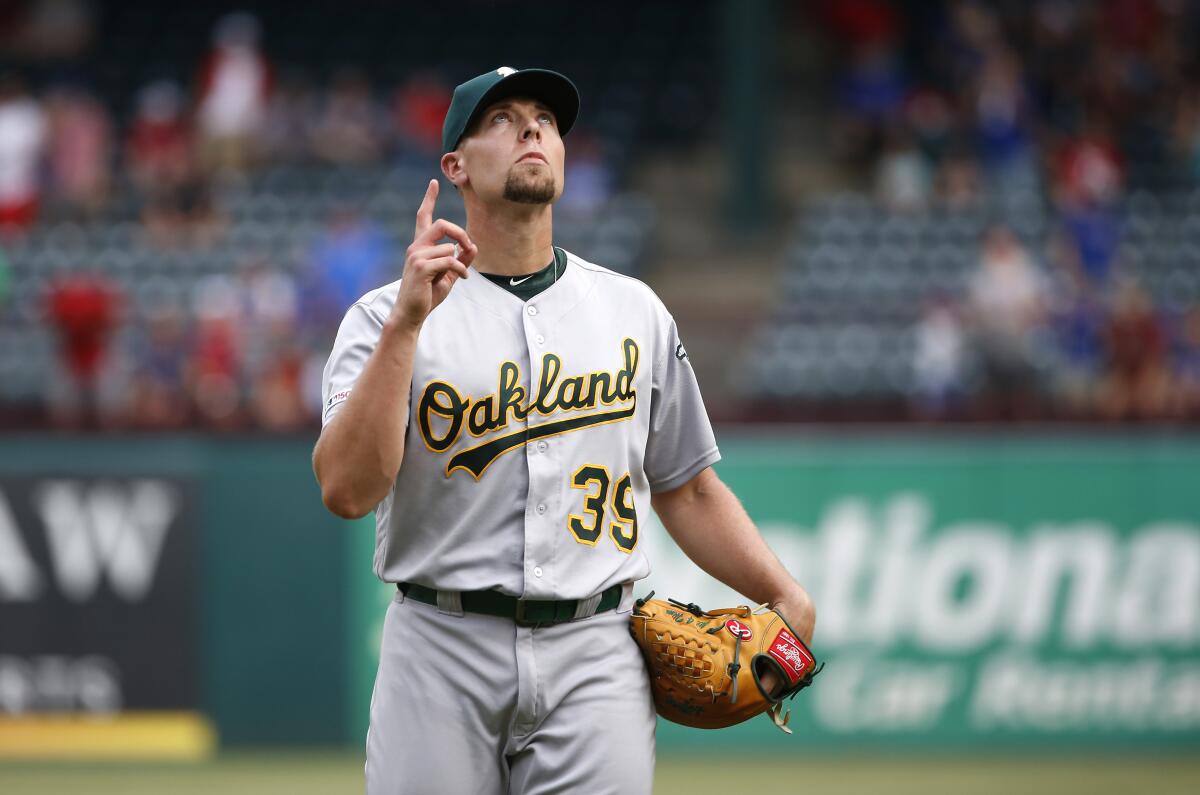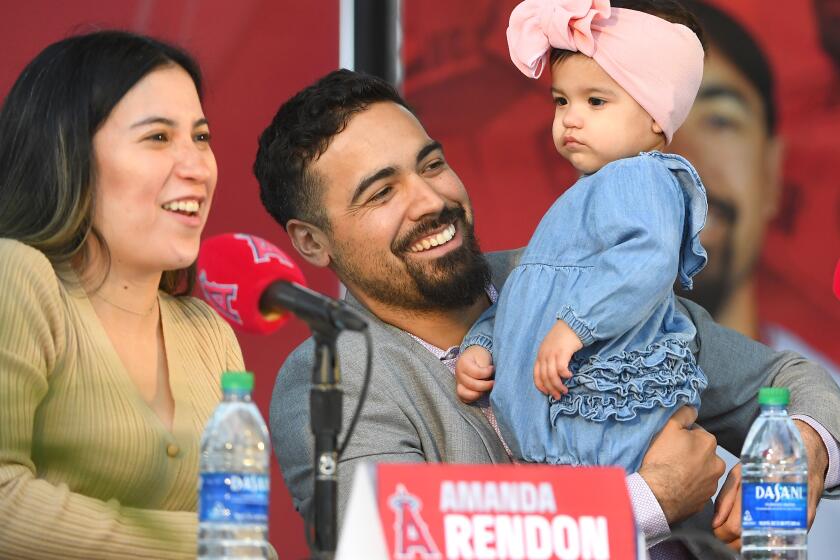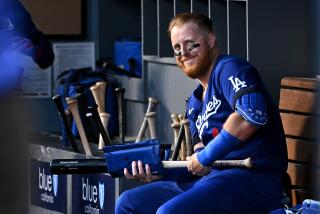‘I’m not a broken pitcher’: Blake Treinen says he can be elite again with the Dodgers

- Share via
Blake Treinen found reassurance in his brief time as a free agent. The Oakland Athletics had decided not to tender him a contract at the beginning of the month, but he quickly realized other clubs were more than willing to take a chance. They believed, like he does, that he could rediscover the formula that made him arguably the best reliever in the major leagues in 2018.
The Dodgers were among those teams thirsting for his services. Their zest stood out in their pursuit of the right-hander. Even after his forgettable 2019 season, they pictured him as someone who could secure significant late-inning outs. Treinen saw an appealing opportunity to partner with a perenially playoff-bound club wielding a convincing plan for him. This week, the sides agreed on a one-year, $10-million contract.
“I’m going to sit here until I’m blue in the face and tell you guys it’s not who I am as a pitcher,” Treinen said in a conference call with reporters Sunday morning. “And I believe the rest of the league believes that as well.”
The bullpen was the only area the Dodgers wanted to specifically address this season. While they have sought elite talent elsewhere, they decided the relief corps required an improvement. The Treinen from 2018, not 2019, would provide one.
Two seasons ago, Treinen, 31, registered one of the best seasons for a reliever in recent history. He compiled a 0.78 ERA (earned-run average), 1.82 FIP (fielding independent pitching), and 0.83 WHIP (walks and hits per innings pitched). He struck out 11.2 batters per nine innings, posted 38 saves, and made the American League All-Star team as the Athletics’ closer.
With Corey Kluber on his way to Texas by trade, the Dodgers remain linked to Indians shortstop Francisco Lindor and pitcher Mike Clevinger.
Last season was a struggle. His ERA (4.91), FIP (5.14), WHIP (1.62), and walk rate (5.7 per nine innings) climbed. His strikeout rate tumbled nearly 10%. Eventually, he lost his job.
The earlier success stemmed from his ability to command his elite sinker, a pitch he throws close to 100 mph. Treinen’s sinker velocity remained in the high 90s — 96.7 mph in 2019 compared with 97.4 mph the year before — but his spin rate dropped and opponents’ hard-hit contact rate climbed 7%. Treinen mentioned two reasons for the drop-off: his inability to consistently locate his sinker and his mental approach.
“When things are going right, there’s not a lot of thought behind it,” Treinen said. “It’s almost an unconscious feeling. I don’t really have a short answer for you on that.”
Injuries were a factor last season — he spent time on the injured list with a strained right shoulder, and a back injury ended his year in mid-September as Oakland advanced to the postseason without him — but he passed his physical and said he was on track to be ready for the start of the 2020 campaign.
That makes the Athletics’ decision to non-tender him more stupefying. Oakland could have traded Treinen before the tender deadline or simply tendered him a contract to later trade him. Multiple teams were willing to discuss a trade with the Athletics before he became a free agent. Evidence of clubs’ high interest in Treinen is evident in the Dodgers’ commitment. He will earn $10 million; MLB Trade Rumors projected he would have made $7.8 million in his final year of arbitration.
At a news conference introducing him as an Angel, Anthony Rendon says he appreciated the Dodgers’ interest, but the team to the south was a better fit.
The Dodgers paid the price because they believed Treinen was still an elite reliever. He’s currently projected to serve as a set-up man for closer Kenley Jansen, but that can change if Jansen continues his downward trend. Whatever his role, Treinen is focused on proving himself right, along with the Dodgers and the other teams who believed in his abilities.
“I’m not a broken pitcher,” Treinen said, “and I feel like that’s kind of been the consensus across baseball right now.”
More to Read
Are you a true-blue fan?
Get our Dodgers Dugout newsletter for insights, news and much more.
You may occasionally receive promotional content from the Los Angeles Times.









